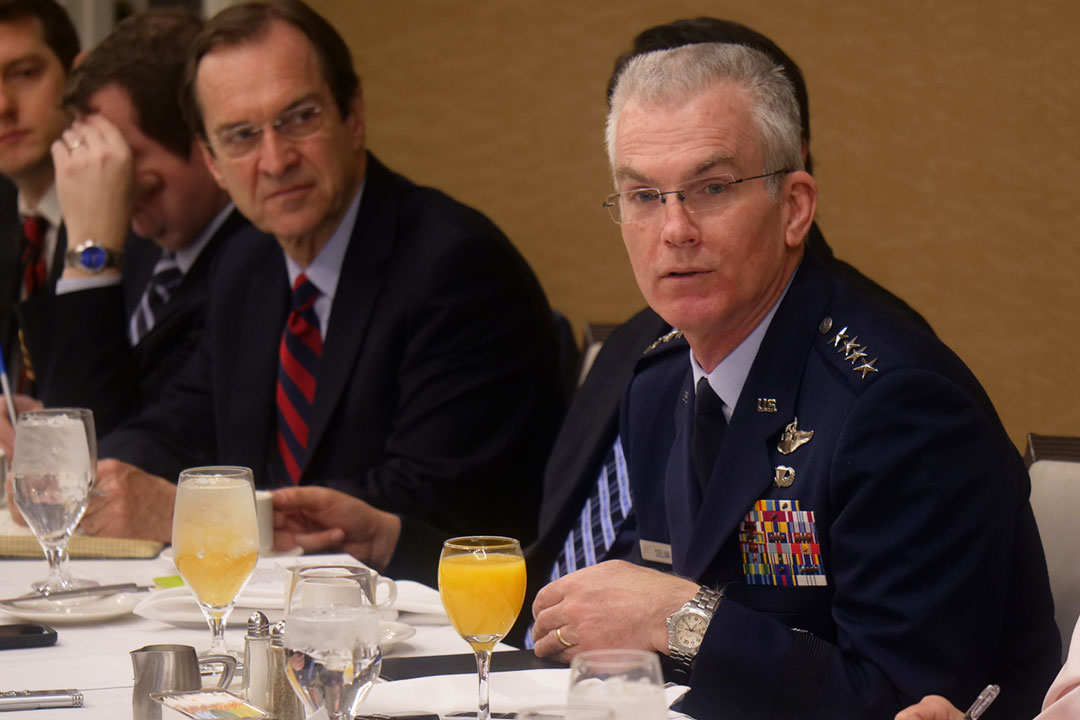At a time when disinformation is a growing threat, SMPA's Project for Media and National Security is bringing decision-makers and the media face-to-face to strengthen coverage and public understanding of vital national security issues. Since launching in August 2017, the Project has benefited from GW's strong community of leading national security scholars while deepening the university's access to top military and security officials.
The Project inherited the Defense Writers Group, an association of defense and national security correspondents with 50 member news organizations from around the globe. The 40-year-old Washington institution was founded in the wake of the Vietnam War to restore trust between U.S. military leaders and the media.
The organization has hosted scores of top defense and intelligence officials over the years, producing transcripts used by journalists and historians for insights into the decisions made by top security officials.
Since moving to GW, 12 Defense Writers Group events brought journalists and students together with top security officials including House Armed Services Committee chairman Rep. Mac Thornberry (R-Texas), Vice Chairman of the Joint Chiefs of Staff Gen. Paul J. Selva and Army Chief of Staff Gen. Mark Milley.
With over 1,800 military-affiliated students enrolled at GW — including veterans, active duty, dependents, reservists, National Guard and ROTC students — and strong academic programs in media and national security, the Project has found many opportunities to actively engage the GW community.
Students from GW’s Trachtenberg School of Public Policy and Public Administration, School of Medicine & Health Sciences and Elliott School of International Affairs have attended Defense Writers Group sessions with policymakers.
When Lt. Gen. Charles D. Luckey, chief of Army Reserve and Commanding General of the U.S. Army Reserve Command, joined a Defense Writers Group breakfast in January, Major Emily Pengelly, a GW graduate student studying Anatomical and Translational Sciences and member of the Army Reserves, had the opportunity to observe the session and meet Lt. Gen. Luckey.
Major Pengelly served as a physician's assistant from 2003 – 2015 and is considering enrolling in medical school following graduation. Lt. Gen. Luckey encouraged her to become a doctor and said the Army would be happy to help foot the bill for medical school.
“Going forward, we plan to connect many more GW students with top national security officials, and hope to do the same for GW national security scholars,” said Project for Media and National Security Director David Ensor.
Ensor has been invited to moderate conversations around campus including an SMPA event on cybersecurity featuring Gen. Michael Hayden and Rep. Will Hurd (R-Texas). As a former diplomat and director of Voice of America, he is also actively engaged as the GW Institute for Public Diplomacy and Global Communication 2017-18 Walter Roberts Fellow and delivers guest lectures in SMPA courses.
As a former Moscow correspondent for ABC News, he has participated in meetings with the Program on New Approaches to Research and Security in Eurasia, a project housed at GW's Elliott School with a network of 80 academics across North America and post-Soviet Eurasia.
“I don’t know anyone who takes journalism more seriously or who understands national security issues more comprehensively than David. He is ideally suited to lead the program and extend its mission to our faculty and students,” said Frank Sesno, director of SMPA and a longtime Washington journalist who worked with Ensor at CNN.
Support for the Project is provided in part by a grant from Carnegie Corporation of New York.


